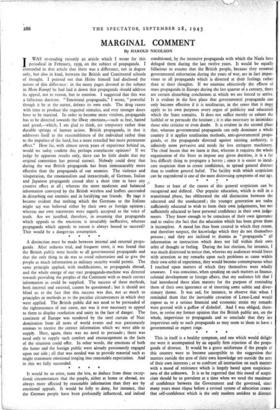It would be an error, none the less, to deduce
from these excep- tional circumstances that the people, either at home or abroad, are always more affected by reasonable information than they are by emotional appeals. It would be folly to deny, for instance, that the German people have been profoundly influenced, and indeed conditioned, by the intensive propaganda with which the Nazis have deluged them during the last twelve years. It would be equally fallacious to assume that the British people, because they resented governmental exhortation during the years of war, are in fact imper- vious to all propaganda which is directed at their feelings rather than at their thoughts. If we examine objectively the effects of mass propaganda in Europe during the last quarter of a century, there are certain disturbing conclusions at which we are forced to arrive. It is evident in the first place that governmental propaganda can only become effective if it is totalitarian, in the sense that it must apply to its own purposes every organ of publicity and education which the State contains. It does not suffice merely to exhort the faithful or to persuade the hesitant ; it is also necessary to intimidate those who criticise or even doubt. It is evident in the second place that, whereas governmental propaganda can only dominate a whole country if it applies totalitarian methods, anti-governmental propa- ganda, or the propaganda directed against existing authority, is infinitely more pervasive and needs far less stringent machinery. The chief lesson that we learn is that, whereas it requires the whole organisation of the State to impose any given doctrine, it is a far less difficult thing to propagate a heresy ; since it is easier to incul- cate suspicion than to create confidence, to spread general distrust than to confirm general belief. The facility with which scepticism can be engendered is one of the most distressing symptoms of our age.


























 Previous page
Previous page